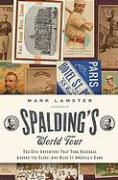


Baseball Toaster was unplugged on February 4, 2009.
Email me at btimmermann@gmail.com
Select a date:
 Last year, I heard a lot of good things about Mark Lamster’s Spalding’s World Tour, but I never got around to reading it. Maybe it was because Amazon.com kept telling me I had to read it and I decided to rebel. But I think laziness was a big part of it.
Last year, I heard a lot of good things about Mark Lamster’s Spalding’s World Tour, but I never got around to reading it. Maybe it was because Amazon.com kept telling me I had to read it and I decided to rebel. But I think laziness was a big part of it.
But now I’ve read Lamster’s book and I really wished hadn’t passed it up last year as it was a great work of baseball history as well as a top notch travelogue. It’s a well-written, thoroughly researched tale of a long journey by some of baseball’s top stars in an attempt to popularize the sport worldwide and also make some money for Al Spalding’s sporting goods empire.
While the trip didn’t do much for baseball’s popularity worldwide at the time, it wasn’t for a lack of trying. Spalding put out a sizeable chunk of his own money to finance a trip that started in Chicago and featured two teams, the Chicago White Stockings (now the Cubs) and the All-Americans (an All-Star team of players who were willing to make the trip). They traveled across the U.S. and from there on to Australia, Ceylon (now Sri Lanka), Aden (now part of Yemen), Cairo (where a game was played in front of the Pyramids), and then throughout Europe before coming back to the U.S.
All of this took place after the end of the 1888 and before the start of the 1889 season. As a backdrop to the trip, National League executives were hatching a plan called the Brush Classification System, where player salaries would be determined by a pay scale based upon whatever management thought a player was worthy of. To say it wasn’t overly popular with the players was an understatement.
The book is rich in detail as Lamster gives vivid description of what travel was like in 1888-89. There are difficult treks across the ocean on steamers. There is a minstrel show performer along for the trip who is continually mistreated by the players, especially Cap Anson, who wanted to use the man as live bait for a shark. There is a debate over whether or not a game can be played on a Sunday in Honolulu. The ruling white government won’t allow it, but the figurehead king wants one. In the end, there wasn’t one, just a big luau.
But the star of the book is Albert Goodwill Spalding, a man who was almost already larger than life in 1888 and almost literally owned the sport of baseball as he controlled the manufacturing of much of the game’s equipment. Spalding hoped to find fertile markets to sell his wares overseas and also try to show off the superiority of America’s new favorite sport to the Old World.
It didn’t quite work out for Spalding, as baseball never really took root in any place the team visited (Japan and the Caribbean were not on the itinerary). It may not have helped that Spalding tried to do things like rent out the Coliseum in Rome for a game. Spalding offered to pay extra to the Italian goverment, but had no clue as to why it was impossible. Spalding also tricked the players into going round the world because when they left the U.S., they were told they were just going to Australia. A few days out to sea, Spalding told them it was a round the world tour. Spalding also refused to pay the expenses of Chicago player Ned Williamson after he couldn’t play any more games after incurring a serious leg infection, a condition which ultimately contributed to his death at age 36 in 1894. At least no one suggested that Williamson be used as shark bait.
Lamster has written a travelogue from the 19th Century that can appeal to readers from the 21st Century. It’s a wild journey around the world. Baseball is the backdrop and it’s best to let it all wash over you as you read it.
but thanks again for the review Bob!
Comment status: comments have been closed. Baseball Toaster is now out of business.